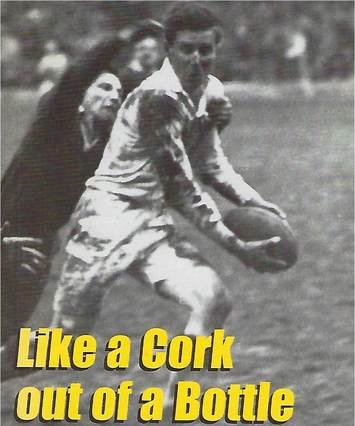When I read a book I usually like to take a sort of running jump at it. Authors like Scott and Dostoevsky tend to start slowly and it is not fair on a book to read five or ten pages a night before going to bed, lose interest, and then blame the book.
In the same way, to anyone intending to lead a new life I would say, 'Start thoroughly; take a running jump.'
One sure way to do that is to be completely honest, with God and maybe a trusted friend - our sins in murky detail may not look so attractive after all.
And when you become a trusted friend yourself, there is a rule: listen and then forget.
Solzhenitsyn in his The Gulag Archipelago, expressed these thoughts that he had had when he was in prison: 'Remember all your previous life. Remember all you did that was bad and shameful and take thought. Cannot you possibly correct it now? Yes, you have been imprisoned for nothing, you have nothing to repent of before the state and its law - but before your own conscience....'
I remember first playing rugby football. I was twelve, and I began very tentatively. Fear of getting hurt made me flinch all the time, and the result was that I constantly did get hurt. It was two years before I made an all-out tackle. Suddenly a game that I hated became a game that I loved.
C S Lewis, in his book Surprised by Joy, describes his road to faith. He writes: 'Dreams of childhood and adolescence have much in common: in between is boyhood, which is very much like the Dark Ages, in which everything has been greedy, cruel, noisy and prosaic, in which the imagination has slept and the most unideal senses and ambitions have been restlessly, even maniacally, awake.'
That is why I say 'Start thoroughly'. If we do not face the truth, Christ cannot give us the freedom that He promised. We remain actors.
Frank Buchman once said that his main work was 'uncorking' people. We so easily get blocked up. He also talked about people who were starched and ironed without being washed. Without allowing Christ to cleanse us from our past - distant and recent - we can easily yield to discouragement and despair.
But suppose we've started on a new road, how do we continue?
A prime secret of victory is to see that our lives are built around other people, and not our own spiritual development.
Mother Teresa said: 'How strange that Christ should spend thirty years doing nothing, wasting His time, not giving a chance to His personality and His gifts.' In fact He laid down His life for others and for the world.
Another secret is to spend enough time with God in quiet. David says in Psalm 23: 'The Lord gives me everything. He gives me rest and righteousness, and restores my spirit when it is frail. He removes my fears. He guides me, comforts me, fills, fills to overflowing. He gives me a permanent home - abiding in Him.'
What a promise! But there is a condition. We have to give God time and space to do these things for us. It may mean going to bed earlier so that we can rise early enough to enable this to happen.
This time enables me to start each day afresh. The great Scottish writer and scientist Henry Drummond said: 'Don't give people a thimbleful of the Gospel.' If I'm going to give people bread instead of stones I need to be filled anew each day and have my purity renewed. St Paul wrote: 'If you're not pure enough to be at your best all the time, you're cheating people.'
Finally, it is important to find a big enough aim in life. 'Thy Kingdom come, Thy Will be done on earth as it is in heaven' could become a commitment. But there may be also what Mother Teresa called 'a call within a call'. For her a call to become a nun became a call to serve the poor. Gandhi wrote: 'The leadership of the true man of God is measured by the purity of his life, the selflessness of his mission and the breadth of his outlook.'
Eric Liddell, hero of the film Chariots of Fire, gave up his sporting success to become a missionary in China. He wrote: 'The bravest moment of a man's life is the moment he looks at himself without wincing, without complaining.... Build the habits of your life round the early morning hour. Be silent. Bathe yourself in God's word. Write down what comes. Pore over it. Don't read hurriedly. When a person hurries through a wood, few birds and animals appear. They hide. But if he sits down and waits they come out. Finally, act.'
These thoughts came in a manuscript discovered about 40 years after his death and published in a paperback, The Disciplines of the Christian Life. The book includes these lines of his:
When God loves He loves the world.
When God gives He gives His Son.
When God invites He invites everybody.
When God saves He saves everlastingly.
English


